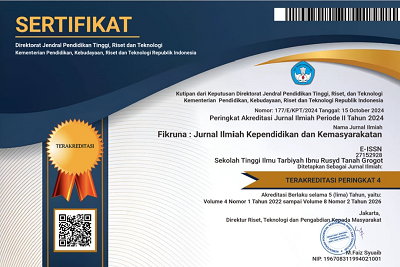HAFIZUN INFLUENCE ON AL-KASBU IN ISLAMIC BANKS IN EAST KALIMANTAN PROVINCE
Abstract
This article aims to analyze in depth the influence of the concept of Hafizun on al-Kasbu in Islamic banks in East Kalimantan Province. This study uses quantitative and qualitative approaches that are useful for explaining the existence and role of a research object or research variable on other research variables descriptively, by analyzing the causal relationship between research variables statistically. The results of the study indicate that Hafizun, which is the motivation of employees at Islamic banks in East Kalimantan Province, consisting of benefits, luck, seeking wealth through worship, working with the heart, seeking Allah's pleasure, peace of mind, living for the hereafter, and toyiban, has a significant positive influence on al-Kasbu. As Hafizun increases, al-Kasbu also increases, with Hafizun always feeling emotionally connected to the Islamic Bank, ultimately creating strong al-Kasbu at the Islamic Bank in East Kalimantan Province. This is evidenced by the increasing values of all Hafizun indicators, where the graphical trend has been rising over the past five years, from 2008 to 2012. Hafizun has a significant positive influence on al-Kasbu, and the better/higher the level of Hafizun, the better/higher the level of al-Kasbu. This study rejects Blancard and Abraham Maslow's theory of leadership and work motivation, which emphasizes indicators such as: praise, material rewards, wages, and worldly well-being. However, in terms of intuitive analysis, employees of Islamic banks in East Kalimantan Province perceive well-being as both material and spiritual, with indicators of motivation and faith in worldly life ultimately leading to happiness in the afterlife. Most employees are happy because they are grateful for the dynamic process of Allah's destiny that continues to unfold. The integrated conclusion of this study is that Hafizun has a significant positive influence on al-Kasbu.
References
Al-Qarni, A. (2007). La Tahzan: Don't be sad. Darussalam.
Ali, A. J. (2010). Islamic perspectives on management and organization. Edward Elgar Publishing.
Avolio, B. J., Walumbwa, F. O., & Weber, T. J. (2009). Leadership: Current theories, research, and future directions. Annual Review of Psychology, 60, 421-449.
Baron, R. M., & Kenny, D. A. (1986). The moderator�mediator variable distinction in social psychological research: Conceptual, strategic, and statistical considerations. Journal of Personality and Social Psychology, 51(6), 1173.
Bass, B. M. (1985). Leadership and performance beyond expectations. Free Press.
Chapra, M. U. (2000). The future of economics: An Islamic perspective. The Islamic Foundation.
Dusuki, A. W. (2008). Banking ethics and the global financial crisis: A comparative analysis of Islamic and conventional banking. Emerald Group Publishing Limited.
Herzberg, F. (1959). The motivation to work. John Wiley & Sons. (Google Scholar)
Hofstede, G. (2001). Culture's consequences: Comparing values, behaviors, institutions and organizations across nations. Sage publications.
Iqbal, M., & Molyneux, P. (2005). Thirty years of Islamic banking: History, performance and prospects. Palgrave Macmillan.
Khan, T., & Bhatti, M. I. (2008). Islamic banking and finance: Fundamentals and practices. International Journal of Islamic and Middle Eastern Finance and Management, 1(3), 206-221.
Lewis, M. (2001). Islamic leadership: A comparative study. Leadership & Organization Development Journal, 22(4), 182-189.
Locke, E. A., & Latham, G. P. (2002). Goal setting theory: An empirical review and some new directions. In L. L. Cummings & B. M. Staw (Eds.), Research in organizational behavior (Vol. 14, pp. 1-54). JAI Press.
Maslow, A. H. (1943). A theory of human motivation. Psychological Review, 50(4), 370-396.
Metwally, M. M. (1997). Islamic economics: A comparative approach. Routledge.
Meyer, J. P., & Allen, N. J. (1997). Commitment in the workplace: Theory, research, and application. Sage Publications.
Northouse, P. G. (2018). Leadership: Theory and practice. Sage publications.
Pfeffer, J. (1998). The human equation: Building profits by putting people first. Harvard Business Press.
Ryff, C. D., & Keyes, C. L. (1995). The structure of psychological well-being revisited. Journal of Personality and Social Psychology, 69(4), 719.
Saleh, Z., & Zulkifli, N. (2007). The relationship between Islamic work ethics and organizational commitment. Jurnal Pengurusan, 26, 87-104.
Wright, T. A., & Cropanzano, R. (2000). Psychological well-being and job satisfaction as predictors of job performance. Journal of Occupational Health Psychology, 5(1), 84.
Ahmed, H. (2002). Role of Zakat and Waqf in Poverty Alleviation. Islamic Research and Training Institute, Islamic Development Bank.
Ariff, M. (1998). Islamic banking. Asian Development Bank.
Ayub, M. (2007). Understanding Islamic finance. John Wiley & Sons.
Bakar, N. A., & Ibrahim, I. (2012). The impact of Islamic work ethics on job satisfaction and organizational commitment: A study of Malaysian Islamic banks. International Journal of Islamic and Middle Eastern Finance and Management, 5(4), 324-341.
Farooq, M. O. (2010). Conventional and Islamic banking: A comparative analysis. International Journal of Islamic and Middle Eastern Finance and Management, 3(3), 228-247.
Ghozali, I. (2018). Aplikasi analisis multivariate dengan program IBM SPSS. Badan Penerbit Universitas Diponegoro.
Hair, J. F., Black, W. C., Babin, B. J., & Anderson, R. E. (2010). Multivariate data analysis. Pearson Education.
Hasan, Z. (2006). Islamic banking and finance: A guide to theory and practice. Oxford University Press.
Iqbal, Z., & Mirakhor, A. (2007). An introduction to Islamic finance. John Wiley & Sons.
Javed, M. Y., & Ilyas, M. (2018). The impact of Islamic work ethics on employee performance: A study of Islamic banks in Pakistan. Journal of Islamic Business and Management, 8(2), 1-20.
Khattab, H. (2005). Islamic banking and finance. Routledge.
Luthans, F. (2011). Organizational behavior: An evidence-based approach. McGraw-Hill/Irwin.
Robbins, S. P., & Judge, T. A. (2017). Organizational behavior. Pearson Education.
Copyright (c) 2025 Maria Wati

This work is licensed under a Creative Commons Attribution-NonCommercial 4.0 International License.



.png)












